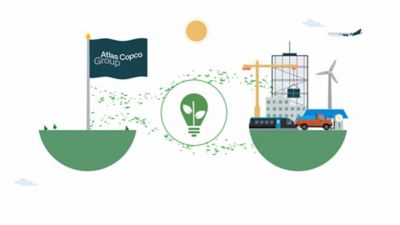Stakeholder consultation informs our strategy and targets
In 2021, Atlas Copco Group conducted a so called ‘materiality analysis’ to gain the perspectives of external and internal stakeholders and to identify strategic risks and opportunities.
A ‘materiality analysis’ is a form of stakeholder consultation in which we ask those who have an interest in Atlas Copco Group and how we do business to evaluate the importance of a certain set of topics – our carbon footprint, gender balance, and approach to safety and well-being, for example.
The process involves in-depth interviews with stakeholder groups such as customers, employees, investors, non-governmental organizations, peers and board members. The interviews complement internal and external surveys promoted via several channels, to gather maximum input.
The input is collected and analyzed by third-party experts. The materiality matrix shows the importance of each topic in terms of its relationship to our success and our economic, social and environmental impact. Atlas Copco Group has thus far conducted a materiality assessment around every three years.
A new so called 'Double Materiality Assessment' was conducted in 2023, covering both financial materiality and impact materiality. The result of the materiality analysis in 2021 is presented below.
The result of the materiality assessment in 2021 was discussed in internal workshops in which the non-financial targets are reviewed. Those workshops involved employees representing functions such as marketing, purchasing, engineering, HR, logistics and SHEQ (safety, health, environment and quality). Their recommendation for Group targets reflecting the prioritized topics was then reviewed by Group Management.
The result from the 2021 assessment and discussions showed that the top priority areas remained the same: People, Ethics, Products and service, Safety and wellbeing, and the Environment. Compared to the analysis done in 2018, our stakeholders placed increased focus on diversity and inclusion, and talent development and retention. Gender balance in leadership positions within the Group also gained attention. Issues relating to climate change, such as circular business models, life-cycle approach to product development, and carbon impact were also prioritized higher by stakeholders compared with the previous years’ analyses.
Among the topics identified as less material were water use, community engagement and tax policy.
The findings provided a basis for our Group targets 2022-2024 and 2030.
- Material topics 2022-'24 914.2 kB, PDF
- Materiality Assessment 737.4 kB, PDF





